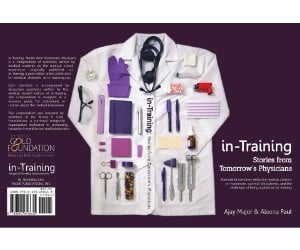Earlier this year SDN member bob123451 was the lucky intern starting residency on night float covering multiple surgery services—vascular, general, bariatrics, colorectal, and a number of subspecialties—at a community hospital. Understandably nervous about jumping in with both feet, he reached out to the SDN community for advice. The following tips may be helpful, should you find yourself in the same boat.
healthcare
5 Things I Wish I Knew At The Beginning of Medical School
It is not just nostalgia and excitement that grips me as I am nearing the end of medical school. A part of me is terrified at the thought of finally having to own that white coat, to be the person in charge. There is another part (though not as dominant) that is filled partly with regret. Regret over the things I didn’t do, the things I could have done differently, the moments I missed, the unnecessary anxieties…
Humanitarian Opportunities for Medical and Pre-Med Students
Although repeated to the point of being cliche, “to help people” is one of the most popular answers would-be doctors give when asked why they want to go into medicine. The great news is that there are many humanitarian work opportunities for pre-med students, med students and even new doctors to undertake that will not only hone their clinical skills and make them more culturally competent physicians, but also allow them to give medical care to those who might not otherwise receive it.
Not “Ours” Anymore: Sharing Our Doctor Spouses
By Amy Rakowczyk
One thing is certain during medical school: your medical spouse is going to study and work a lot of hours. This is a necessary part of becoming a doctor. They need years of studying, preparing, and training in order to be able to perform the job. The time required means that you, the medical student spouse/partner, will have less time with them. There will be fewer hours when they are available. That is the hard reality.
It’s easy to start thinking about how unfair this is. You are left with gaping holes of time and are by default in charge of all the non-medical school items. You are working harder too, with less support. The unfairness of it can quickly turn into resentment and bitterness.
A Scribe Case Study: Alyssa Kettler
When did you first hear about medical scribes?
I first heard the term ‘medical scribe’ from a friend of my mother, a nurse at Fairview Hospice. She knew that I was looking for meaningful work to undertake before pursuing medical school and suggested I explore scribe opportunities. After extensive online research, I began scribe training with Elite Medical Scribes.
Book Review | in-Training: Stories from Tomorrow’s Physicians
In early 2012, medical students Ajay Major and Aleena Paul started in-Training.org, a website dedicated to the medical student community at large with a goal—according to the site—to become “the intellectual center for news, commentary, and the free expression of the medical student voice.” Since then, the site has grown by leaps and bounds, recently celebrating their 1000th article publication. Four years after the launch of the website, Major and Paul—who are now beginning their residency training—compiled around 100 of these essays into a book: in-Training: Stories from Tomorrow’s Physicians.
How Test Prep Prepares Me To Be An Effective Physician
Before medical school, the dream of becoming a physician involves helping people and curing disease. During medical school, that dream matures through educational and clinical experiences into a realization that being a physician is something much deeper, a permanent responsibility that only those who are doctors themselves will understand.
Every patient is a trial and error that can lead to life or death. Is the abdominal pain just constipation, a brewing appendicitis, or even worse, colon cancer? Is the patient presentation worthy of simple reassurance, or perhaps blood work, or—to be safe—diagnostic imaging?
Managing Bipolar Disorder in Medical School
Two days before interviewing at the medical school I now attend, I couldn’t get out of bed. At the nadir of my eighth major depressive episode in eight years, I seriously considered whether I could make the trip. Thankfully, I did. And thankfully, six days after that interview I met the psychiatrist who would finally piece together my long and steadily worsening psychiatric history.
I sat in his office, quiet and dulled compared to my spring and summer self, and began recounting my story – the weightiness of my current depression, the semester in college marked by a mere two to four hours of sleep a night (“insomnia” according to my doctor then), and the clockwork nature of my mood changes each year. Within ten minutes, he stopped me mid-sentence and said, almost casually, “You know, you show a lot of signs of bipolar disorder.”
How Nontraditional Students Can Best Position Themselves When Applying to Med School
A friend of mine studied film in college and subsequently found himself working as a cameraman for a documentary television program about the lives of EMTs and ER physicians. He experienced some very tense situations, and from his work decided that he wanted to do more than document how people received medical care—his desire was to participate in the action of helping others as a doctor.
Unfortunately, his film education was the furthest possible undergrad experience he could have from pre-med. He had no applicable science credits, no anatomy or physiology, and the only shadowing he had done of physicians had been with a camera in hand. In short, his path would be an arduous one, and he was soon going to turn 31.
A Portrait of Obstetrics & Gynecology
Central to the skillset of every physician is the differential diagnosis; this is the process by which new patients are evaluated to establish the most likely diagnosis. Similarly, the first clinical year of medical school is like a differential for each student, except instead of a medical diagnosis, students are seeking to determine which specialty they will choose. This column explores this differential: experiences from each rotation by a current third year student.
Having finished my first rotation, Women’s Health Clerkship, I’d like to offer a short look into the specialty, sharing some of my observations the last few weeks. As I have said often over the past two months, I believe this was the perfect rotation to kick off third year. OB/GYNs have a wide scope of practice, and their field contains elements of many other specialties. During this rotation I was exposed to clinical medicine, by which I mean the art of seeing patients in a clinical setting, spending a few minutes with each, and using history and physical exam skills to offer a diagnosis and treatment plan. I was also exposed to surgery. I hadn’t realized just how surgical of a specialty it is, or at least can be, depending on how a doctor chooses to practice. (More on that later.) I also saw some inpatient medicine, managing patients in a hospital setting and consulting with other specialties as needed. And of course, OB/GYNs have a very unique aspect of medicine that is theirs alone: the labor & delivery floor. This breadth of practice settings was an excellent introduction to many aspects of medicine that I’m only beginning to understand.
Paving the Road to Medical School
The path to becoming a doctor can feel daunting. For those of us that don’t come from a medical family, it can be challenging to navigate what all you need to do to be a competitive candidate. As a third year psychiatry resident looking back on my pre-med days, I realize just how lost-in-the-woods I felt at times trying to figure out how to get where I wanted to go. Here are half a dozen steps you can take to help pave the way to medical school.
Q&A with Physician-Author with Michael Collins, MD
Tell me about yourself – who you are, what you do, where you practice. I … Read more
Why Black Lives Matter Ought to Matter to Medical Students: A Familiar Message Revisited
Reposted from here with permission. “Of all the forms of inequality, injustice in health care … Read more
Diversity in Med School: What Minority Applicants Need to Know
While getting accepted into medical school is more difficult than ever in America, there are … Read more
Sleep Deprivation and Residents: Are We on the Right Track?
The tradition of long hours on the floor is an old one in American medical training. And criticism of this tradition is of long standing too. The controversy over the grueling residency schedules is not a new one, but neither is it one that has been successfully resolved. It can still spark off strong feelings in both the proponents and opponents of cutting back on the length of residency shifts and/or the time off between shifts for professionals engaged in this important stage in their medical education. What’s more, it is a topic which has pitted respected healthcare institutions such as the Harvard School for Public Health and the American Academy of Family Physicians against one another, so much so that this issue is not likely to be resolved anytime soon.
Who Makes a Good Doctor? How Medical Schools Around the World Try to Find the Best Candidates
One of the continuing challenges for medical schools both here in the United States and around the world is to find ways to select the students who will have the best chance of successfully completing their education. The goal of a good medical education, after all, is to train students who go on to become doctors, helping to fill the enormous global demand for well-trained, competent physicians. What might surprise many students, however, is how many different ways medical colleges around the world have come up with to find these ideal candidates–and how widely medical education varies from one country to another.
Chronicles of a Med Student: And That’s a Wrap!
Whew! It’s been a long year and I am itching for a much-needed, well-deserved break. Thankfully, summer is here to save me. I can’t wait to talk about my summer plans and all the ways to spend the summer between first and second year (also sadly known as your last summer ever). I think it will be beneficial to recap what I’ve discovered this past year!
Choosing a Residency That’s Right for You
If you are in medical school, you have been making choices for a long time now, from what to major in as an undergraduate to what volunteer work during your gap year will give you the best chances at getting a coveted med school slot. But now that you are in medical school, one of the most important decisions still lies ahead: what kind of residency should you choose? This is an incredibly important choice that will shape the rest of your career. A good decision now will make it more likely that you will be satisfied with your professional life down the road.
The choice can be a difficult one. What things should you consider before you decide? Read on to find out more about the steps you should take in order to match to a residency that will leave you both personally and professionally satisfied.
Challenges Remain for Female Medical Students
It might actually come as a surprise to many would-be medical students that gender is an issue that still affects those who are training for a career as a doctor. After all, there are more women in medicine than ever before–and certain areas of practice have become largely female-dominated. Despite this, however, gender attitudes can color nearly every aspect of medical education.
Women in Medicine: Close to Parity – at Least In Numbers
Statistically, if you just look at the numbers, the participation of women in medicine has indeed come a long way. According to the AAMC, as of 2013, of the 20,055 students who were accepted into medical schools across the country, the split between men and women was almost evenly divided: 53% male and 47% female. It is important to look at these stats in terms of their historical context in order to truly appreciate them.
Physician Employment Contracts Part II: The Story Continues
Make sure to check out Part I here!
Today’s article takes a closer look at several key terms in employment contracts that can have a significant impact on a new physician – compensation methods, incentive compensation and outside work or “moonlighting”. Building on our first article that examined termination provisions, non-compete clauses, professional liability insurance and indemnification, we will identify key issues in evaluating compensation models and moonlighting and outline some of the questions to consider before signing on the dotted line.




















